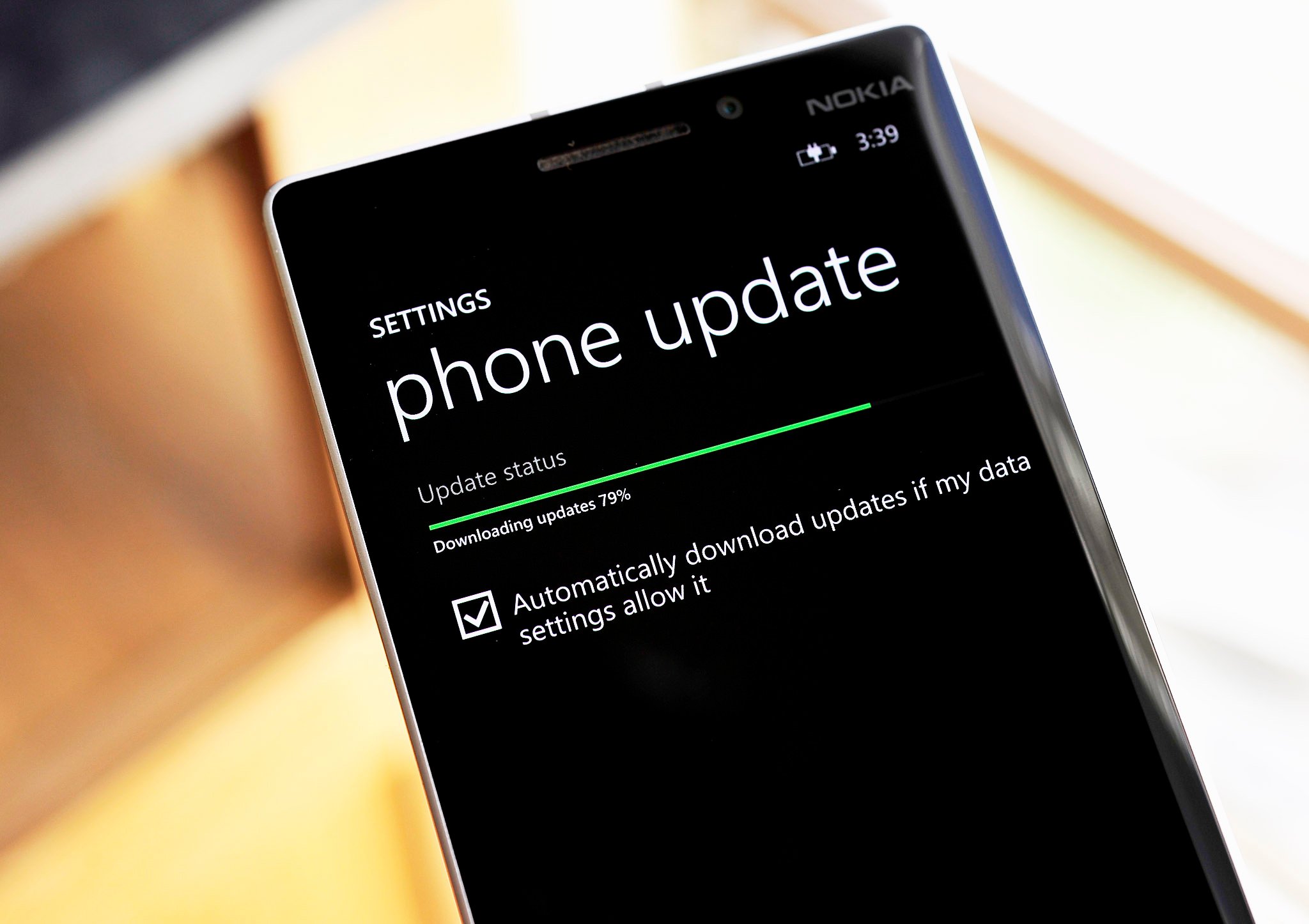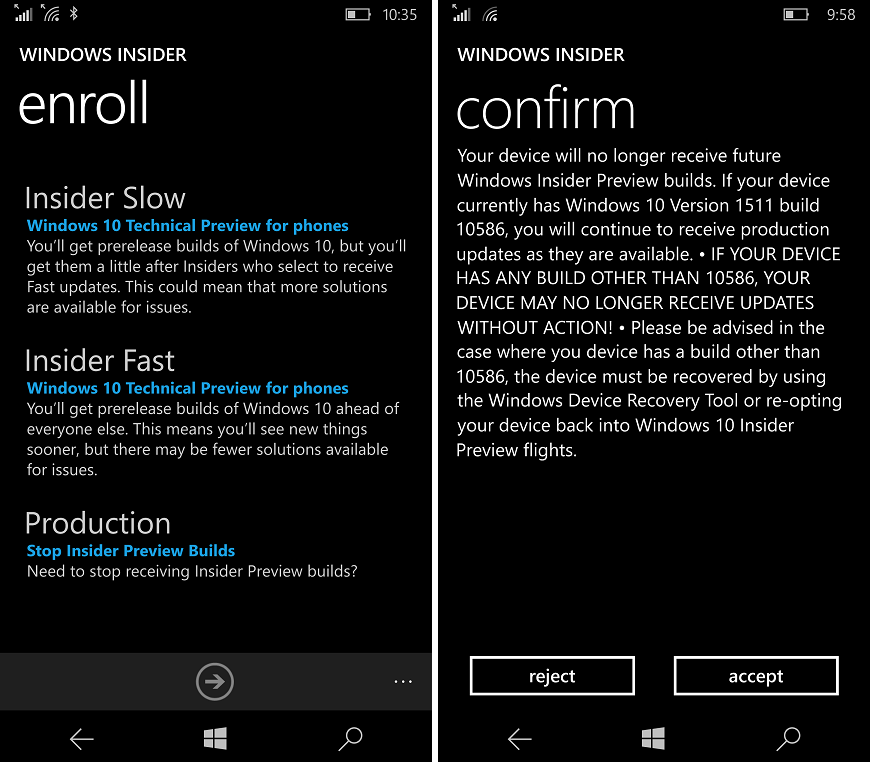Microsoft launches Firmware Auto-Publishing for Windows 10 Mobile Insiders on March 3

Earlier today, Microsoft pushed out a new build of Windows 10 Mobile to Slow and Release Ring Insiders. Starting tomorrow, anyone enrolled in any Ring in the Insider program can begin getting new firmware automatically as long as there is firmware available for that device.
The problem before
Previously, users on any track of the Insider program would have to rollback their phone to Windows Phone 8.1 if on Windows 10 Mobile to get new firmware if it were made available.
Recently, Microsoft released a temporary workaround by pushing new firmware to the newly formed Release Ring. Instead of rolling back the OS, a user could drop down to Release/Production ring and grab the firmware then go back to the Slow or Fast Ring without having to touch the OS.

The problem with both of the above scenarios was a user would not be notified of an impending firmware update. As a solution, Microsoft announced a plan late last month that is now ready to go live.
Starting tomorrow, anyone enrolled on an Insider Ring will have to take no action to get new firmware if it becomes available.
Many phones are not getting firmware right away
To be clear, not all devices will start to get firmware tomorrow. Microsoft is simply changing the backend so that if firmware goes live for your device in your country you will not have to switch rings or roll back the OS to get it. The firmware will just be pushed.
Carriers still matter
However, firmware for carrier-supported devices like the AT&T Lumia 950 will still require carrier approval before going to your phone. What Microsoft is doing tomorrow is not a shortcut around that limitation initiated by carriers.
Get the Windows Central Newsletter
All the latest news, reviews, and guides for Windows and Xbox diehards.
Any firmware that touches the radio stack often requires US carriers to validate the update first before letting it user devices. Unlocked and non-carrier branded devices do not suffer from this limitation.
Read more in our article 'Here is how Microsoft can push OS updates to Windows 10 Mobile without carriers now (and forever)'.
Older Windows Phone 8.1 devices?
Microsoft addressed older phones and their firmware status for Windows 10 Mobile back on February 25. To reiterate:
"For existing 8.1 devices, Win10 update is going to be only SW update, but in order to fix few issue, there will be FW updates for some devices which are still based on 8.1 SW before they can receive Win10 update. Right now we have not communicated what 8.1 devices will get updated and when but please have the latest SW on all your 8.1 in preparation of win 10."
As of now, there is nothing to report for older devices, but that may change in the coming weeks.
Microsoft answers questions
To head off any problems in advance Microsoft answered some questions about tomorrow's change that we'll republish below:
Q: Which devices have new firmware updates available today? Is my device on the list?
A: Please see this list: firmware variants
Q: What steps do Insiders need to take to receive this new firmware?
A: Starting tomorrow, none! As of March 3rd all Windows 10 firmware updates will be auto-published for Insiders and you will receive these updates automatically.
Q: My device had new firmware published previously, but I have not switched to the Production ring to install it. Will I need to take those steps?
A: As of tomorrow, no! We have submitted all available firmware updates for Windows 10 devices to be auto-published. This means any firmware updates that are available for Windows 10 devices will be available and not require any manual steps for Insiders to obtain.
Microsoft concludes the post with the following message:
"These changes have been several months in the making, and a big thank you goes to the Insiders for the continued feedback and suggestions that have helped guide these changes. It is our hope that this new process enables you to stay up-to-date with firmware updates while making it a simple process to receive them."
Finally, Microsoft also announced that "an additional group of firmware updates for Lumia 950 devices" although as of now the AT&T Lumia 950 is not on that list to our knowledge.
You can see the list of devices getting new firmware here.
Source: Microsoft Support Forums

Daniel Rubino is the Editor-in-chief of Windows Central. He is also the head reviewer, podcast co-host, and analyst. He has been covering Microsoft since 2007 when this site was called WMExperts (and later Windows Phone Central). His interests include Windows, laptops, next-gen computing, and wearable tech. He has reviewed laptops for over 10 years and is particularly fond of 2-in-1 convertibles, Arm64 processors, new form factors, and thin-and-light PCs. Before all this tech stuff, he worked on a Ph.D. in linguistics, performed polysomnographs in NYC, and was a motion-picture operator for 17 years.